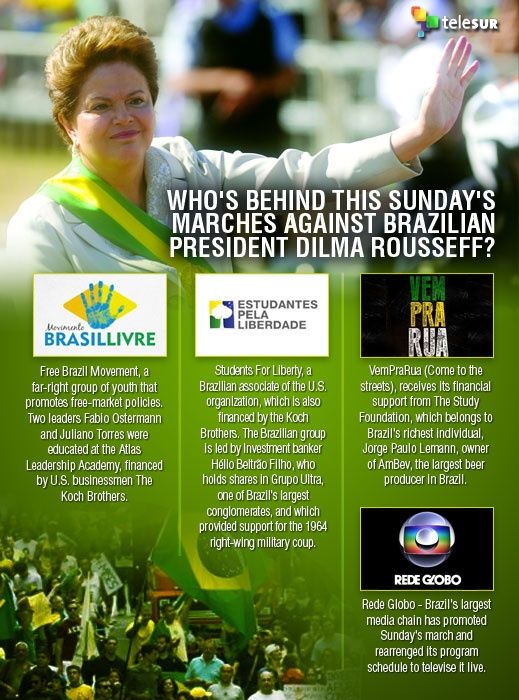In March, political forces organized mega-marches against the democratically-elected government of Dilma Rousseff. The conspiracy began against the left-wing president immediately after it became known that she had won the run-off election in October 2014 against the candidate of the Brazilian elites, Aecio Neves.
The right-wing political opposition in Brazil has been reluctant to accept the results of that election, seeking to implement their neoliberal agenda by whatever means they can. The opposition, like their right-wing contemporaries in the rest of Latin America, have become frustrated at their repeated electoral defeats. The left-wing Workers’ Party (PT) has been in power since Rousseff’s predecessor, Luiz Inacio Lula da Silva, was elected president in 2002.
Leaders of the Free Brazil Movement (MBL), one of the main organizers of Sunday’s marches, told Folha de Sao Paulo, “The main aim of the movement, at this moment, is to overthrow the PT, the biggest nemesis of freedom and democracy that haunts our country."

In light of this goal, the MBL has been pushing for impeachment proceedings against Rousseff. Supporters of the government consider this an attempt to hold a “third round” of elections. They accuse opponents of wilfully ignoring the fact that Rousseff won the election with 51.64 percent of the vote, in an election that was affirmed by the Supreme Electoral Tribunal.
Rousseff has referred to the attempt to hold a “third round” as a break with democratic order in the country. “The election is over. A third round … can not occur unless one wants a break with democracy," she said during an event earlier this month.
The Brazilian Social Democratic Party (PSDB) is also backing the marches on Sunday, but stops short of backing a call for the impeachment of Rousseff. The party’s national president and former presidential candidate Aecio Neves said he would not personally attend, but the party and its members would attend. Read More...
In a statement released Friday, the PSDB criticized those who said the marches Sunday are calling for a break with democratic order. However, there are numerous groups openly calling for the military to intervene and remove Rousseff from power. These groups have stated that they also back the marches and will turn out and demand a military intervention.
Calls for a coup to remove the PT from power are not new. Shortly after Rousseff’s re-election in October, supporters were mobilized to defend Rousseff’s victory and reject calls for an impeachment or military intervention. The opposition insists that Brazil is in the midst of a political crisis.
In an interview with Carta Capital, Miguel Rossetto, secretary-general of the office of the presidency, said, “There is no political crisis. The neoliberals and conservatives were defeated electorally, the crisis is theirs, because they lost.” Read More...
The opposition has been successful in utilizing a corruption scandal at Petrobras, the state oil company, to mobilize Brazilians in protest. The opposition has deliberately tried to tie Rousseff to the Petrobras scandal, despite the fact that she has been cleared of any involvement. A new expanded investigation into the scandal named a number of high-ranking politicians, however Rousseff is not under investigation. Read More...
The powerful private media in Brazil has been key to trying to tie Rousseff to the Petrobras scandal. Veja magazine deliberately published unsubstantiated accusations that both President Rousseff and her predecessor were connected to the scandal in order to try to influence the election. The Center for Economic Policy found the media disproportionately represented Dilma Rousseff and the Workers Party in an unfavorable light compared to opposition candidate Aecio Neves.
Brazilian media giant Rede Globo has also played an active role in mobilizing against the PT governments. The network has changed its programming in order to encourage more people to attend the marches and will broadcast Sunday’s events live on its networks. Erick Bretas, one of Globo's directors, publicly announced that he would attend Sunday's march.
The controversy over the role played by Globo is such that supporters of the government have taken to calling them coup-backers and have been denouncing them over social media. Read More...